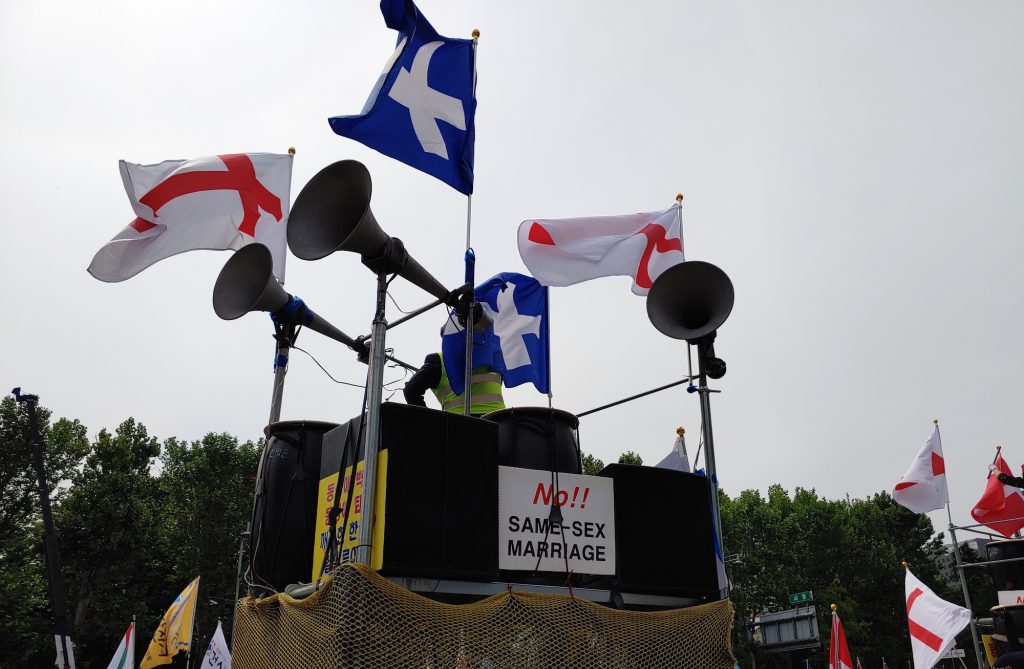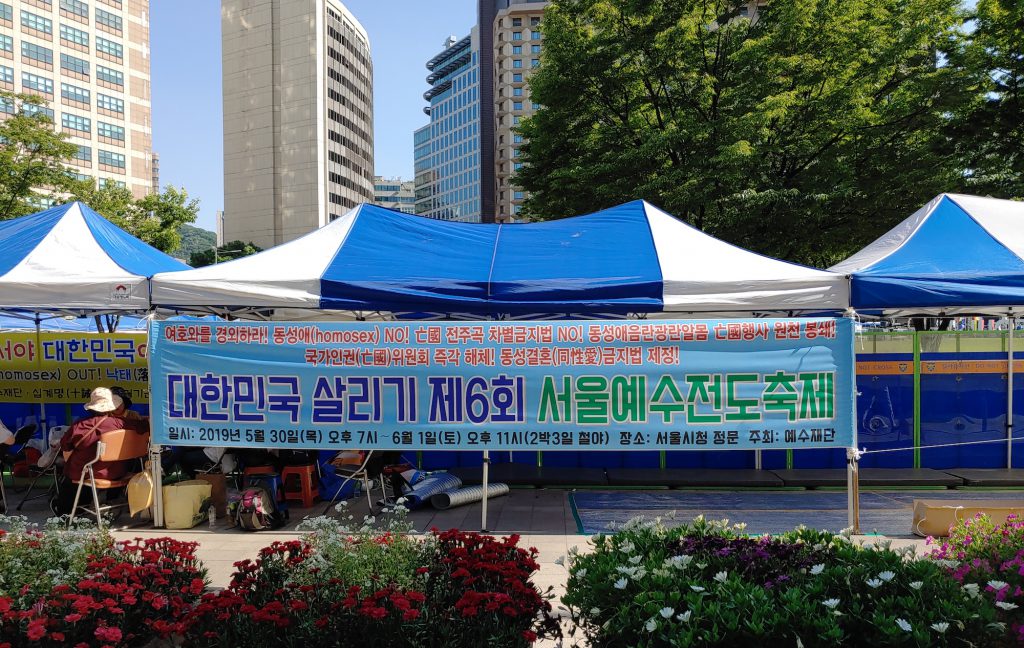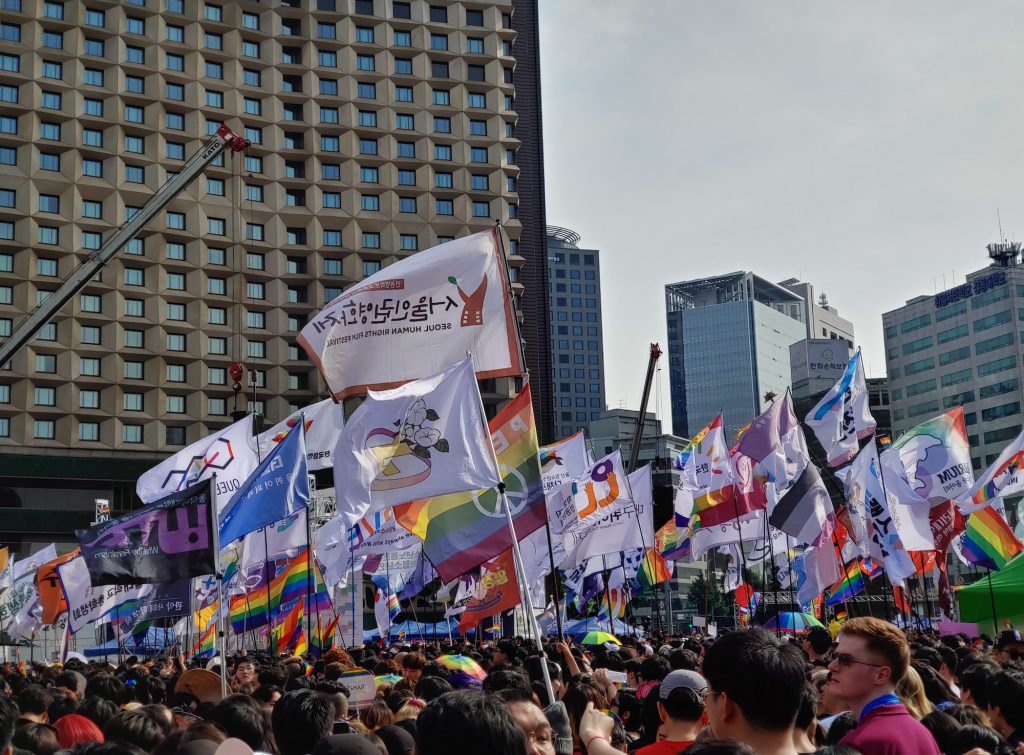Far-right Protestantism United by Opposition and Hatred
Recently, far-right Protestants have been raising their voices inside and outside the Church with various opposition movements, including anti-feminist, homophobic xenophobic, anti-refugee, and anti-Islamic. They work by spreading fake news, a mix of fact and lies, through so-called “church KakaoTalk chats,” Protestant-affiliated newspapers, websites, and YouTube channels. The activities of Shincheonji, a Protestant cult, and far-right Protestants in general, have never been as dominant among ordinary people and Christian communities as in 2020. What pastor Jeon Kwang-hoon and his supporters showed in their rallies was very similar to the Shincheonji scandal in the spring of 2020. When the coronavirus rapidly spread in Daegu, especially among members of Shincheonji, they did not cooperate in preventing the further spread of the virus, instead providing a false list of members. Pastor Jeon Kwang-hoon’s group was also found to have lied about participants in his rallies. Although he initially registered the 100-member rally and said he did not encourage people to attend en masse, the truth was that he systematically contacted supporters behind the scenes and planned large-scale demonstrations, then submitted a fabricated list for the police investigation. I felt more disappointed with this lie than with their far-right stance. The Christian Council of Korea, where pastor Jeon Kwang-hoon served as chairman, accounts for 18 percent of active Protestant churches in Korea. The council considers Shincheonji a cult, but the council and Shincheonji are conservative right-wing comrades, both religiously and politically.
Protestant rightists are closely related to modern Korean history, and their ideology and conservative beliefs are anti-intellectually combined.9 Protestantism and socialism were at odds during the liberation and the Korean War; an ideological massacre of North and South Koreans, including by the Northwestern Youth League, an anti-communist group organized by the Youngnak Church at the time of the USAMGIK, was carried out in the South and North. When the military regime was formed in South Korea, the important forces were from the Japanese military and the Northwestern Youth League. In the fifth year of the South Joseon Defense Academy by National Defense Command (now the Korea Military Academy), two-thirds of students were from the Northwestern Youth League. They later led the May 16 military coup d’état under Park Chung-hee, and it is no coincidence that Protestants then filled the majority of political and intelligence agency positions. In South Korea, military coups and dictatorships continued, and ideological conflicts were a good tool to control the people. Until the 1980s, if someone merely mentioned reunification between the two Koreas, they were accused of being a “commie.” The anti-intellectual aspects of right-wing Protestant churches are also related to the compressed economic development of South Korean society and its rapid social change. People moved to the city in large numbers and began to flock to churches that promised mystical “healing rallies (revival assemblies)” and “saving the three beats” of health, money, and soul for those living impoverished lives, suffering from poverty or disease. In this way, anti-communism, materialism, conservatism, and anti-intellectualism have become engrained in ideology and beliefs based on Protestantism.
The attitude of conservative Protestants on the issue of refugees in recent years, which has grown out of this problematic historical background, has been very embarrassing. Public opinion was divided over whether to accommodate five hundred Yemeni refugees who arrived on Jeju Island in early 2018. The Korean Church Press Association, which has represented the position of the conservative Protestant community, issued a ridiculous statement saying: “Most of the killings and terrorism that occur around the world these days are perpetrated by Muslims.”10 At that time, violent fake news was being distributed in large quantities, spreading Islamophobia. Fake news posted on an Islamophobic website in the US said: “92 percent of sexual violence in Sweden is caused by Muslim refugees and half of the victims are children,” and “the sexual offence rate of Afghan immigrants is 79 times higher than that of Koreans.” The Esther Prayer Movement, a far-right Protestant organization, imported this message and disseminated it in Korea.11 Later that year, only two of the five hundred Yemeni refugees received refugee status. Only 4.1 percent of asylum seekers receive refugee status in South Korea, which is only one-sixth of the world’s average of 24.1 percent.12
What about their attitude toward women who “hold up half the sky”?13 Far-right Protestant groups have recently started to use the term “anti-feminism,” but in fact, all Protestant churches have been oppressing women for many years. Behind the rapid growth of the Korean Church were a considerable amount of donations from women, along with their service, but it was practically impossible for women to be “promoted” to an elder of a church congregation. There was only one female elder among fifty elders in the church I used to attend. Even in churches that allow women to train to become pastors, it is very difficult for them to have the opportunity to lead a service in reality. According to a survey in 2018, female delegates of the General Assembly of the Church made up only 14.3 percent of the Korean Methodist Church, 9.1 percent of the Presbyterian Church in the Republic of Korea (KiJang), and 1.1 percent of the Presbyterian Church of Korea (TongHap).
Female congregation members should not be regarded as fools. When I was working at a women’s organization of a denomination, I had the impression that women members were aware of the pastor’s wrongdoings, but endured him in order to sustain a family-like church, just like they endured their own patriarchal fathers. However, women are no longer holding back. The number of Protestants has declined by 1.39 million over the past ten years, decreasing every year, with the number of believers in the most conservative Presbyterian Church of Korea (Hapdong) falling the most.14 According to a survey conducted by the Korean Federation of Churches a few years ago, women no longer want the role traditionally asked of them by the Church and have turned their backs more than men, with now only 50 to 60 percent of churchgoers being female; previously this was 70 to 80 percent.15 If the Church maintains a misogynistic stance, it cannot survive as a sustainable religion.
In recent years, Korean society has resummoned feminism and women’s movements have gained momentum. In the past, they have tended to be neglected over other social agendas such as the anti-dictatorship pro-democratic movement and the reunification movement, but now they are closer to the fore. In summer 2018, young women protested against biased investigations into hidden-camera crimes in the country. This was the biggest ever protest by women to highlight issues solely faced by women, drawing 70,000 people—more than double the protest of the Korean Confederation of Trade Unions at a similar time. But alt-right website Ilbe Storage argues that men and women in Korean society are already equal, and that men in their twenties and thirties are rather the victims of reverse discrimination. Can that be true? In 2018, women earned on average just 66.6 percent of what men earned, and Korea marked the lowest for the gender wage gap and the glass ceiling index among major OECD-member countries. How then could this be reverse discrimination? It is a big concern as there are many women who commit suicide because of related frustrations. The suicide rate of women in their thirties is seven times higher than in their mothers’ generation.16 After the 1997 foreign currency crisis and the 2008 financial crisis, two out of three women became temporary or part-time workers. Women’s college entrance rate is 8 percent higher than that of men, but women’s educational background and skills do not lead to increased social status in the labor market. Due to Covid-19, 120,000 women in their twenties lost their jobs in March 2020, but the media focused on unemployment among men. Women’s unemployment is by no means trivial; this reality is not unrelated to the high suicide rate among young women.



